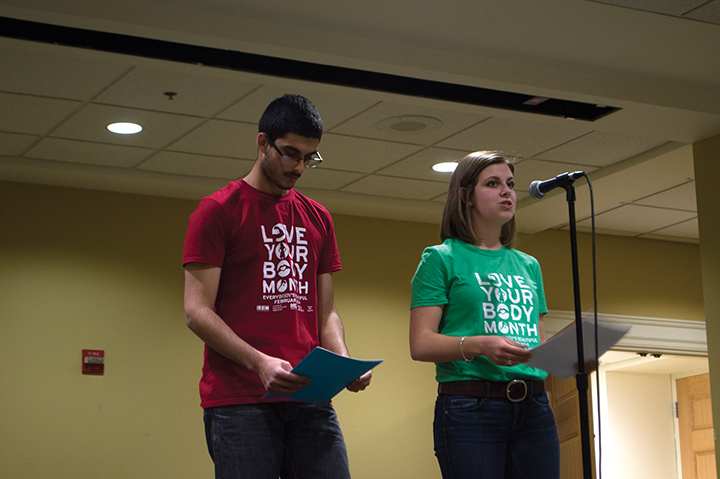
Health Works peer educators Chris Noronha, a sophomore community health major, and Emily Tolino, a sophomore nutrition and food sciences major, hosted the Body Image Open Mic event event in the Stamp Grand Ballroom Tuesday night.
Editor’s note: Two sources’ last names have been withheld to protect their privacy.
It started out quietly. The microphone waited.
And then, slowly, students came up one by one to offer advice, tell personal stories, ask questions and bring up topics pertaining to body image issues.
Body Image Open Mic night gave students the opportunity to talk about difficult topics from eating disorders to transgender confusion in a safe environment at the Grand Ballroom Lounge in Stamp Student Union last night. The event drew about 50 students and was part of “Love Your Body Month” which is through the University Health Center and co-sponsored by MICA and the One Project.
Some students, such as senior nutrition and food sciences majors Shelby Santin and Alexandra Raymond, had come prepared to take the stage.
“We consider ourselves positive body image advocates on-campus. We constantly hear negative comments from our peers especially related to their appearance or other people’s appearances,” Santin said. “This is normalized in our society, but we both believe that this needs to stop. This body-bashing leads to toxic environments. Our philosophy is that change begins in the individual.”
Santin and Raymond started a movement called “From College Girl to College Girl,” which includes a weekly blog, Facebook page and Twitter account that focus on eating disorders, body image and nutrition. One of their blog posts contrasted two perspectives on life, and they asked the audience to notice the negative versus positive self-talk.
“Negativity is contagious, but positivity is even more contagious,” Raymond said. “So let your positivity shine through in order to put an end to this toxicity that we’re used to.”
The event was emceed by two HEALTH Works peer educators, Emily Tolino and Chris Noronha. They encouraged students to come up and speak, even if they didn’t have anything prepared.
“I commend any of you who is constantly facing a struggle with eating disorders or how they perceive their bodies because it can really affect every facet of your life,” said Noronha, a sophomore community health major. “It really takes a toll, and that constant fight is really admirable.”
Sophomore journalism major Alicia said she had never really talked about her disorder in such an environment, but chose to tell her personal story anyway.
“Whenever I started the diet that took me down the road of an eating disorder, all of the women in my life were really proud,” she said.
Now, she said, she realizes how damaging that perspective can be and wishes she could have helped her little sister when she came to talk to her about weight.
“I didn’t say to her, ‘You are the perfect weight you are,’ because in my head I was so warped,” Alicia said. “I wish I had said to her, ‘You don’t need to be smaller; you need to be bigger; you need to have bigger dreams than losing weight.’ My thought and my hope for my sister is that she can decide she wants something bigger, to dream bigger.”
Lizz Bondarenko said she knew she would have regretted it if she didn’t get up to speak, so she talked about what makes her proud of her body.
“The past couple weeks I’ve been training for a marathon, and in all of my training I’m learning to love my body for what it can do rather than how it looks or how it comes across to other people,” the senior psychology major said.
Recently she’s been inspired by the quote, “You can’t save the world with skinny legs.”
Someone asked how they can help a friend who they think might be struggling with an eating disorder, and together the audience made a do’s and don’ts list. Another student asked how she could help her mother be proud of her body.
Brenna, a sophomore enrolled in letters and sciences, decided to share a poem she wrote about her battle with her eating disorder, which she said she is now free from.
“Please tell me who taught women to measure themselves by the negative space around them. Who taught me the more I shrink, the lovelier I will be?” she said. “I no longer focus on those who fall in love with me, because I am in love with myself. I am a warrior, and no one will stop me. Now I know that my worth can never be captured in a number, because I am priceless.”
Noronha even took a turn telling his story to the audience.
“Sometimes I look at myself and say I could be muscular, and as a guy I should be like those stereotypical males, but the fact that I’m alive, I appreciate tremendously,” he said. “We’re all human beings, not human bodies.”



